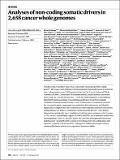Files in this item
Analyses of non-coding somatic drivers in 2,658 cancer whole genomes
Item metadata
| dc.contributor.author | PCAWG Drivers and Functional Interpretation Working Group | |
| dc.contributor.author | PCAWG Structural Variation Working Group | |
| dc.contributor.author | PCAWG Consortium | |
| dc.date.accessioned | 2020-03-02T10:30:02Z | |
| dc.date.available | 2020-03-02T10:30:02Z | |
| dc.date.issued | 2020-02-06 | |
| dc.identifier | 266499411 | |
| dc.identifier | 1ee80b96-cf60-43b1-9680-426ab681752a | |
| dc.identifier | 85079047263 | |
| dc.identifier | 32025015 | |
| dc.identifier | 000529097800009 | |
| dc.identifier.citation | PCAWG Drivers and Functional Interpretation Working Group , PCAWG Structural Variation Working Group & PCAWG Consortium 2020 , ' Analyses of non-coding somatic drivers in 2,658 cancer whole genomes ' , Nature , vol. 578 , no. 7793 , pp. 102-111 . https://doi.org/10.1038/s41586-020-1965-x | en |
| dc.identifier.issn | 0028-0836 | |
| dc.identifier.other | ORCID: /0000-0002-7876-7338/work/69463476 | |
| dc.identifier.other | RIS: urn:5C688B1BF1125DED5379B5F74D114FAE | |
| dc.identifier.other | RIS: Rheinbay2020 | |
| dc.identifier.uri | https://hdl.handle.net/10023/19565 | |
| dc.description.abstract | The discovery of drivers of cancer has traditionally focused on protein-coding genes1,2,3,4. Here we present analyses of driver point mutations and structural variants in non-coding regions across 2,658 genomes from the Pan-Cancer Analysis of Whole Genomes (PCAWG) Consortium5 of the International Cancer Genome Consortium (ICGC) and The Cancer Genome Atlas (TCGA). For point mutations, we developed a statistically rigorous strategy for combining significance levels from multiple methods of driver discovery that overcomes the limitations of individual methods. For structural variants, we present two methods of driver discovery, and identify regions that are significantly affected by recurrent breakpoints and recurrent somatic juxtapositions. Our analyses confirm previously reported drivers6,7, raise doubts about others and identify novel candidates, including point mutations in the 5′ region of TP53, in the 3′ untranslated regions of NFKBIZ and TOB1, focal deletions in BRD4 and rearrangements in the loci of AKR1C genes. We show that although point mutations and structural variants that drive cancer are less frequent in non-coding genes and regulatory sequences than in protein-coding genes, additional examples of these drivers will be found as more cancer genomes become available. | |
| dc.format.extent | 10 | |
| dc.format.extent | 14979351 | |
| dc.language.iso | eng | |
| dc.relation.ispartof | Nature | en |
| dc.subject | RC0254 Neoplasms. Tumors. Oncology (including Cancer) | en |
| dc.subject | QA75 Electronic computers. Computer science | en |
| dc.subject | 3rd-DAS | en |
| dc.subject | SDG 3 - Good Health and Well-being | en |
| dc.subject.lcc | RC0254 | en |
| dc.subject.lcc | QA75 | en |
| dc.title | Analyses of non-coding somatic drivers in 2,658 cancer whole genomes | en |
| dc.type | Journal article | en |
| dc.contributor.institution | University of St Andrews. School of Medicine | en |
| dc.contributor.institution | University of St Andrews. Statistics | en |
| dc.contributor.institution | University of St Andrews. Sir James Mackenzie Institute for Early Diagnosis | en |
| dc.contributor.institution | University of St Andrews. Cellular Medicine Division | en |
| dc.identifier.doi | 10.1038/s41586-020-1965-x | |
| dc.description.status | Peer reviewed | en |
This item appears in the following Collection(s)
Items in the St Andrews Research Repository are protected by copyright, with all rights reserved, unless otherwise indicated.

